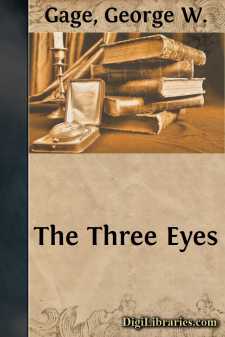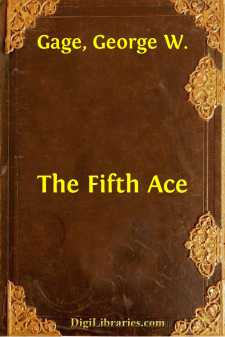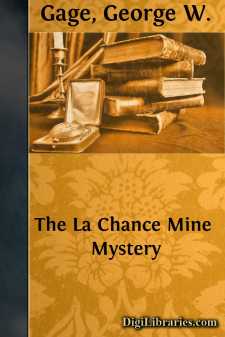Categories
- Antiques & Collectibles 13
- Architecture 36
- Art 48
- Bibles 22
- Biography & Autobiography 813
- Body, Mind & Spirit 142
- Business & Economics 28
- Children's Books 14
- Children's Fiction 11
- Computers 4
- Cooking 94
- Crafts & Hobbies 4
- Drama 346
- Education 46
- Family & Relationships 57
- Fiction 11828
- Games 19
- Gardening 17
- Health & Fitness 34
- History 1377
- House & Home 1
- Humor 147
- Juvenile Fiction 1873
- Juvenile Nonfiction 202
- Language Arts & Disciplines 88
- Law 16
- Literary Collections 686
- Literary Criticism 179
- Mathematics 13
- Medical 41
- Music 40
- Nature 179
- Non-Classifiable 1768
- Performing Arts 7
- Periodicals 1453
- Philosophy 64
- Photography 2
- Poetry 896
- Political Science 203
- Psychology 42
- Reference 154
- Religion 513
- Science 126
- Self-Help 84
- Social Science 81
- Sports & Recreation 34
- Study Aids 3
- Technology & Engineering 59
- Transportation 23
- Travel 463
- True Crime 29
The Three Eyes
by: George W. Gage
Description:
Excerpt
CHAPTER I
BERGERONNETTE
For me the strange story dates back to that autumn day when my uncle Dorgeroux appeared, staggering and unhinged, in the doorway of the room which I occupied in his house, Haut-Meudon Lodge.
None of us had set eyes on him for a week. A prey to that nervous exasperation into which the final test of any of his inventions invariably threw him, he was living among his furnaces and retorts, keeping every door shut, sleeping on a sofa, eating nothing but fruit and bread. And suddenly he stood before me, livid, wild-eyed, stammering, emaciated, as though he had lately recovered from a long and dangerous illness.
He was really altered beyond recognition! For the first time I saw him wear unbuttoned the long, threadbare, stained frock-coat which fitted his figure closely and which he never discarded even when making his experiments or arranging on the shelves of his laboratories the innumerable chemicals which he was in the habit of employing. His white tie, which, by way of contrast, was always clean, had become unfastened; and his shirt-front was protruding from his waistcoat. As for his good, kind face, usually so grave and placid and still so young beneath the white curls that crowned his head, its features seemed unfamiliar, ravaged by conflicting expressions, no one of which obtained the upper hand over the others: violent expressions of terror and anguish in which I was surprised, at moments, to observe gleams of the maddest and most extravagant delight.
I could not get over my astonishment. What had happened during those few days? What tragedy could have caused the quiet, gentle Noel Dorgeroux to be so utterly beside himself?
"Are you ill, uncle?" I asked, anxiously, for I was exceedingly fond of him.
"No," he murmured, "no, I'm not ill."
"Then what is it? Please, what's the matter?"
"Nothing's the matter . . . nothing, I tell you."
I drew up a chair. He dropped into it and, at my entreaty, took a glass of water; but his hand trembled so that he was unable to lift it to his lips.
"Uncle, speak, for goodness' sake!" I cried. "I have never seen you in such a state. You must have gone through some great excitement."
"The greatest excitement of my life," he said, in a very low and lifeless voice. "Such excitement as nobody can have ever experienced before . . . nobody . . . nobody. . . ."
"Then do explain yourself."
"No, you wouldn't understand. . . . I don't understand either. It's so incredible! It is taking place in the darkness, in a world of darkness! . . ."
There was a pencil and paper on the table. His hand seized the pencil; and mechanically he began to trace one of those vague sketches to which the action of an overmastering idea gradually imparts a clearer definition. And his sketch, as it assumed a more distinct form, ended by representing on the sheet of white paper three geometrical figures which might equally well have been badly-described circles or triangles with curved lines. In the centre of these figures, however, he drew a regular circle which he blackened entirely and which he marked in the middle with a still blacker point, as the iris is marked with the pupil:
"There, there!" he cried, suddenly, starting up in his agitation. "Look, that's what is throbbing and quivering in the darkness. Isn't it enough to drive one mad? Look! . . ."
He had seized another pencil, a red one, and, rushing to the wall, he scored the white plaster with the same three incomprehensible figures, the three "triangular circles," in the centre of which he took the pains to draw irises furnished with pupils:
"Look! They're alive, aren't they? You see they're moving, you can see that they're afraid. You can see, can't you? They're alive! They're alive!"
I thought that he was going to explain. But, if so, he did not carry out his intention....





